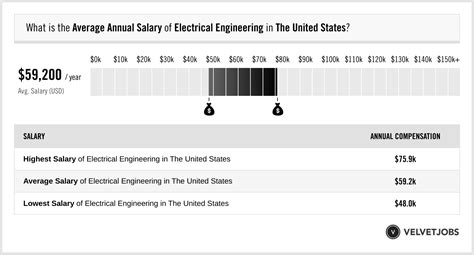Are you passionate about technology and interested in a career that can make a significant impact on society? If so, a career as an electrical engineer might be the perfect fit for you. Electrical engineers play a crucial role in designing and developing electrical systems that power our world, from the devices we use every day to the infrastructure that supports our communities. In this blog post, we will explore the various aspects of the electrical engineering field, including the impact of electrical engineers on society, the process of designing electrical systems, and the importance of specializing in this field. Additionally, we will delve into the factors that influence electrical engineer salaries, career growth opportunities, and tips for negotiating higher salaries. Whether you are considering a career in electrical engineering or are already in the field, this post will provide valuable insights into the opportunities and potential for earning well in this rewarding profession. So, let’s dive in and learn more about the exciting world of electrical engineering and the potential for a well-paying career.
Table of Contents
The Impact of Electrical Engineers on Society
Electrical engineers play a critical role in shaping modern society. Through their expertise in designing and developing electrical systems, they have contributed to advancements in various industries, including healthcare, transportation, communication, and energy. Their work directly impacts the quality of life for people around the world, making electrical engineers indispensable contributors to societal progress.
One of the key ways electrical engineers have impacted society is through their work in the healthcare industry. They have been instrumental in the development of medical devices and equipment, such as MRI machines, pacemakers, and ultrasound technology. These devices have revolutionized the field of medicine, improving diagnostic capabilities and patient care.
Additionally, electrical engineers have played a crucial role in the advancement of transportation systems. They have contributed to the design of electric vehicles, high-speed trains, and traffic control systems, leading to more sustainable and efficient modes of transportation. Their innovations have helped reduce carbon emissions and alleviate traffic congestion, making cities more livable.
Furthermore, the influence of electrical engineers can be seen in the realm of communication and information technology. Their work has led to the development of telecommunications infrastructure, internet connectivity, and mobile devices, enabling global connectivity and access to information. These advancements have transformed the way people communicate, conduct business, and access knowledge, fostering greater interconnectedness and collaboration.
Understanding the Role of Electrical Engineers
Electrical engineers play a crucial role in designing, developing, and maintaining electrical systems that power our modern society. They are responsible for bringing electricity to homes, businesses, and industries, as well as for creating innovations in technology that improve our quality of life.
One of the main tasks of electrical engineers is to design and test electrical equipment and systems, ensuring that they are safe, efficient, and reliable. They also work on improving existing systems and creating new technologies to meet the ever-growing demand for electricity. In addition, electrical engineers often collaborate with other professionals, such as computer engineers, to integrate electrical systems with information technology.
Another important aspect of the role of electrical engineers is to solve complex problems related to power generation, transmission, and distribution. They are constantly seeking innovative solutions to improve energy efficiency, reduce environmental impact, and address challenges related to renewable energy sources. This requires them to stay up-to-date with the latest developments in the field and to apply their knowledge and skills to find practical and sustainable solutions.
Overall, the role of electrical engineers is essential for the functioning of modern society. Their work impacts various industries, including telecommunications, transportation, healthcare, and manufacturing, and contributes to the advancement of technology and the improvement of living standards.
How Electrical Engineers Design Electrical Systems
Electrical engineers play a crucial role in the design and development of electrical systems. They are responsible for creating and implementing electrical designs that are safe, effective, and efficient. Their work involves understanding the principles of electrical engineering, as well as applying their knowledge to real-world applications.
One of the key aspects of designing electrical systems is understanding the requirements and specifications of the project. Electrical engineers need to work closely with clients, architects, and other stakeholders to gather information about the project, such as its electrical load, power sources, and environmental conditions. They must also consider factors such as safety regulations, building codes, and energy efficiency standards when designing electrical systems.
Once the project requirements are understood, electrical engineers use specialized software and tools to design electrical systems. They create detailed electrical schematics, diagrams, and layouts to illustrate the various components of the system, such as wiring, conduits, switches, and circuit breakers. They also analyze the electrical distribution and capacity to ensure that the system can meet the power demands of the intended application.
Additionally, electrical engineers must consider factors such as electromagnetic interference, voltage drop, and short-circuit protection when designing electrical systems. They conduct calculations and simulations to evaluate the performance and reliability of the system, making adjustments as necessary to optimize its design. Overall, the process of designing electrical systems requires a combination of technical expertise, problem-solving skills, and attention to detail.
The Importance of Specializing in Electrical Engineering
Specializing in electrical engineering is crucial for the continued advancement of technology and society. As the digital age continues to evolve, the demand for skilled electrical engineers has never been higher. By specializing in this field, you can position yourself as an expert in designing, developing, and implementing electrical systems that power our world.
Choosing to specialize in electrical engineering allows individuals to focus on specific areas such as power systems, digital systems, control systems, telecommunications, and more. This level of expertise can lead to a more fulfilling career, as well as exciting opportunities to contribute to cutting-edge innovations.
Furthermore, specialized knowledge in electrical engineering can open doors to higher-paying positions and leadership roles within various industries. Employers highly value individuals with specialized skills, as they can offer unique solutions to complex challenges in the field.
Ultimately, by specializing in electrical engineering, you can make a significant impact on the world by driving technological advancements, shaping the future of energy conservation, and contributing to the overall progress of society.
Exploring the Factors that Influence Electrical Engineer Salaries
In today’s competitive job market, it’s important for electrical engineers to understand the various factors that can influence their salaries. Education and experience play a significant role in determining how much an electrical engineer can earn. Those with advanced degrees and years of experience in the field are more likely to command higher salaries.
Location is another important factor to consider. Electrical engineers working in major cities or in regions with a high demand for their skills are likely to earn higher salaries than those working in rural areas or areas with a lower demand for their expertise.
Additionally, the industry in which an electrical engineer works can also impact their salary. For example, electrical engineers working in the aerospace, energy, or telecommunications industries may earn more than those working in other sectors.
Lastly, specialization within the field of electrical engineering can also influence salary potential. Certain specializations, such as power engineering or control systems engineering, may be in higher demand and therefore result in higher earning potential.
Career Growth Opportunities for Electrical Engineers
Electrical engineers have a wide range of career growth opportunities available to them, thanks to the ever-evolving nature of technology and the increasing demand for their expertise. One of the key paths for career advancement in this field is through continuing education and obtaining advanced degrees or certifications. Many electrical engineers choose to pursue a Master’s degree or PhD in electrical engineering, which not only deepens their knowledge and skills but also opens up higher-level job opportunities in research and academia.
Another avenue for career growth for electrical engineers is to specialize in a particular area within the field. By focusing on specific niches such as power systems, telecommunications, or control systems, engineers can become experts in their chosen area and take on more challenging and specialized roles within their organizations. This specialization can lead to increased responsibilities, higher pay, and greater job satisfaction.
Furthermore, seeking out mentorship and networking opportunities can greatly contribute to the career growth of electrical engineers. Connecting with experienced professionals in the field can provide valuable guidance, insights, and potential job opportunities. Engaging in professional organizations, attending industry conferences and seminars, and participating in online forums are all ways to expand one’s professional network and stay updated on industry trends and advancements.
Lastly, taking on leadership roles and pursuing project management opportunities can pave the way for career growth. Electrical engineers who demonstrate strong leadership, communication, and project management skills can progress into managerial and executive positions within their organizations. These roles often come with increased authority, higher salaries, and the chance to shape the direction of technological advancements and engineering projects.
How to Obtain a Well-Paying Job as an Electrical Engineer
As an electrical engineer, obtaining a well-paying job requires a combination of industry knowledge, technical skills, and strategic networking. One of the first steps in this process is to earn a bachelor’s degree in electrical engineering from an accredited institution. This provides a solid foundation of knowledge in areas such as circuit theory, electronics, and electromagnetism.
Once you have completed your degree, it is important to gain relevant work experience through internships or entry-level positions. This hands-on experience not only enhances your technical skills but also demonstrates your practical understanding of electrical systems to potential employers.
In addition to technical expertise, it is crucial for electrical engineers to stay updated with the latest industry trends and technologies. This can be achieved by pursuing continuing education, attending workshops, and obtaining relevant certifications. Employers value candidates who show a commitment to lifelong learning and professional development.
Finally, networking plays a vital role in finding a well-paying job as an electrical engineer. Building professional relationships with industry professionals, attending career fairs, and joining professional organizations can help you connect with potential employers and uncover hidden job opportunities.
Salary Comparison: Electrical Engineering vs. Other Engineering Fields
When considering a career in electrical engineering, one of the important factors to weigh is the potential salary in comparison to other engineering fields. Electrical engineers play a crucial role in designing, developing, and maintaining electrical systems, making their expertise highly sought after in various industries. However, it’s essential to understand how the salary of an electrical engineer compares to that of other engineering disciplines.
According to recent data, electrical engineers typically earn competitive salaries, with the median annual wage surpassing that of several other engineering fields. The specialized skills and knowledge required for electrical engineering positions often result in higher earning potential, particularly in areas such as power and energy, electronics, and telecommunications.
On the other hand, fields such as civil engineering or mechanical engineering also offer lucrative compensation packages and career advancement opportunities. While electrical engineering may have a slight edge in terms of average salary, other engineering disciplines have their own unique benefits and potential for growth.
Ultimately, when deciding on a career path, aspiring engineers should consider not only the potential salary but also their personal interests, long-term career goals, and the specific industry in which they wish to work. By carefully evaluating the salary comparison between electrical engineering and other engineering fields, individuals can make an informed decision about their future career.
Top Industries Hiring and Paying Electrical Engineers
When it comes to the field of electrical engineering, there are several industries that are known for hiring and paying engineers well. One of the top industries for electrical engineers is the technology sector, particularly in companies that design and manufacture electronic devices and components. The demand for electrical engineers in this industry comes from the constant need for innovation and development in electronics, as well as the growing trend towards automation and connectivity.
Another industry that offers great opportunities for electrical engineers is the energy sector, including companies involved in power generation, distribution, and renewable energy. With the increasing focus on sustainable energy sources and the development of smart grid technologies, there is a growing need for electrical engineers to design and maintain the electrical systems that power our world.
Additionally, the automotive industry is a major employer of electrical engineers, as the development of electric and hybrid vehicles requires expertise in electrical systems and power electronics. With the rise of electric vehicles and the ongoing research into autonomous driving technologies, electrical engineers play a crucial role in shaping the future of transportation.
Lastly, the aerospace and defense industry also presents lucrative opportunities for electrical engineers, particularly in the design and development of avionics systems, electronic warfare technology, and satellite communications. The complex and high-stakes nature of this industry means that electrical engineers are in high demand and can command competitive salaries.
Tips for Negotiating Higher Salaries as an Electrical Engineer
Electrical engineers play a vital role in our society, and their work is crucial in the development of various technological systems. With their expertise in designing and developing electrical systems, they are in high demand in various industries. However, negotiating higher salaries as an electrical engineer can be a challenging task, but with the right tips, it can be achievable.
One important tip for negotiating higher salaries as an electrical engineer is to do thorough research on the salary range for your specific role and industry. This will provide you with valuable information that you can use as leverage during salary negotiations. Understanding the market value of your skills and expertise will enable you to confidently negotiate for a higher salary.
Another tip is to highlight your unique skills and experiences that set you apart from other candidates. Showcase your accomplishments, such as successful projects, technical skills, and certifications, which demonstrate your value to the company. By highlighting your expertise, you can make a strong case for why you deserve a higher salary.
Additionally, it is essential to communicate effectively during the negotiation process. Clearly articulate your reasons for requesting a higher salary and be prepared to provide evidence to support your request. Use strong negotiation tactics, such as presenting a well-structured argument and being firm yet respectful in your approach. Effective communication can significantly impact the outcome of your salary negotiation.






